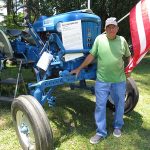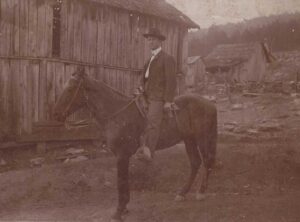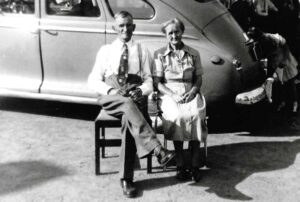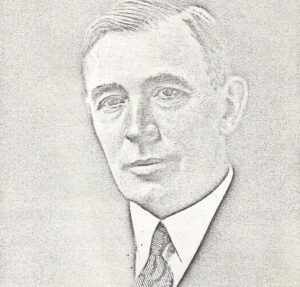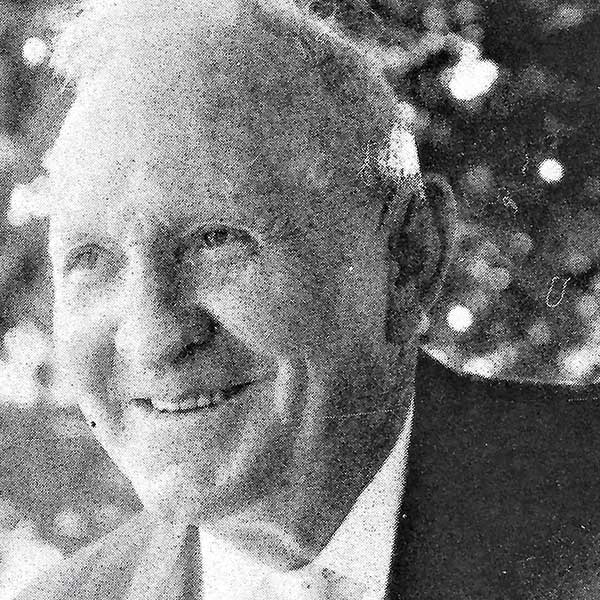
Beloved cheerleader for
Ashville, hometown hero
Story by Joe Whitten
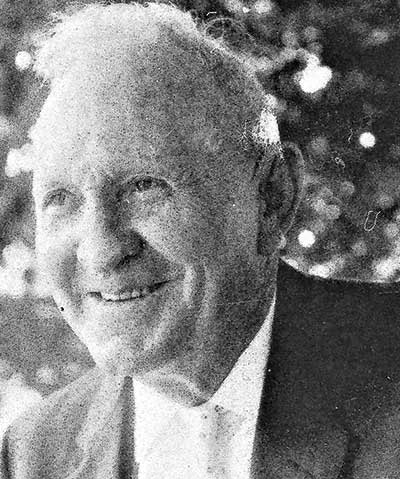
Submitted photos
A quote on Facebook, “Hometown is the place where I was born, where I was raised, where I keep all my yesterdays,” express well Jim Nunnally’s affection for Ashville, Ala., his own hometown.
And although he lived and worked in Texas for many years, he returned to Ashville for his “golden years” and left an enduring influence. Shortly before his death in 1968, Ashville High School dedicated its yearbook to him and established the Jim Nunnally Award to an outstanding athlete.
Born Aug. 5, 1888, James Renfroe Nunnally was the seventh of the 10 children born to Robert Thomas and Emma Mary Montgomery Nunnally. He grew up in Ashville, and when World War I engulfed the globe, he joined the Army and served in the 167 Infantry, the Rainbow Division, which earned renown in France and Germany.
Garrett Spears, a young distant cousin of Jim’s, researched Jim Nunnally for his fourth-grade history project, sponsored and judged by the St. Clair Historical Society. He noted that after the war ended, “the Alabama troops were honored by parades in Gadsden, Anniston, Birmingham, Montgomery and Mobile before being discharged at Camp Shelby.”
Surviving both the war and the flu pandemic of 1918-1919, Jim lived and worked in Birmingham. According to research by Jerri Jenkins of Springville, Jim married Fannie Archer of Birmingham in 1921, but the 1930 U.S. Census shows them as married but living apart: Fannie living with her parents in Birmingham and Jim boarding with Albert and Pauline Teague back in Ashville. By the 1940 census, Jim was divorced and living in Houston, where in 1940 he married Effie Violette Torrance, a naturalized Canadian. Effie died Feb. 4, 1953 and was buried in Forest Cemetery in Gadsden.
Around the time of Effie’s death, Jim returned to his hometown of Ashville and lived in the Teague Hotel, owned by his cousin, Annie Teague McClendon. In July 1958, Jim married Louise Heath of Gadsden, and they continued to live in the hotel until it was sold.
The salient memories of those who knew Jim personally deal with his love of all things Ashville and especially the Ashville High School teams – baseball, football and basketball – that he faithfully supported. Dr. John McClendon, Temple University, recalled recently, “He was there for every sporting event, every practice. I remember when I was in the fifth-grade – I was manager, water boy with the team – and we played somewhere on Sand Mountain, and we got up there about an hour early to warm up, and there were he and Louise already in the stands. I remember the coaches saying, ‘You can’t play far enough away for Jim Nunnally not to be the first person there.’”
Jim’s enthusiasm for all Ashville Bulldogs sports earned him the reciprocating respect and love of the players and students. Dr. McClendon recalled, “Just a few days before Jim died in 1968, the senior class decided to dedicate the annual yearbook to him. The class visited with him shortly before he died to tell him about the dedication. He’d been in the hospital several days and was back home and he died at home.”
The yearbook dedication reads, “Sixteen years ago Jim came back to Ashville after many years away. During these years he endeared himself to all of us because we knew that he was our friend. He had a keen and enthusiastic interest in us and our many activities. He had the ability to be any age he chose to be. Toddlers met him on equal ground. He easily became a pre-teen when one of them sought his company, and he was one of us – the high school gang. He was ageless!
“His three loves were the Rainbow Division of World War I, the town of Ashville and ALL young people.
“To show that we returned his feeling for us, we the Seniors of 1968, lovingly dedicate the annual to his memory.”
Jim died May 7, 1968. To further show their love and respect to this man who had won their hearts, Ashville High School established The Jim Nunnally Memorial Award with these words in the annual: “In honor of a great man who was loved and respected by all at Ashville High School, a memorial award has been established. This athletic award will be presented each year at graduation to a senior girl or boy who has been selected as the ‘Best Athlete.’ We hope this award will promote athletic desire, sportsmanship, scholarship and determination.”
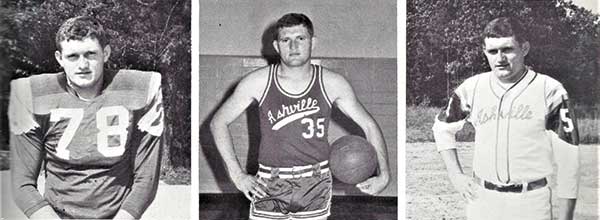
The first Jim Nunnally Memorial Award was presented at the 1969 graduation to Harlan Sanders, son of Mr. and Mrs. Austin Sanders. The 1969 yearbook recorded of Harlan that he lettered four years in football, playing center on offense and linebacker on defense and was voted to the All-County Team. Harlan became the first Ashville player to be voted to the Birmingham Post Herald’s All State Team. He lettered four years in basketball and was team captain of the 1968-1969 team which went to the state tournament and placed on the All-County and All-Area teams his senior year. Harlan also lettered two years in baseball. John McClendon recalled that “the football team Harlan was on was one of the best in Ashville history – 8-2 record.”
The Jim Nunnally Memorial Award is still presented at Ashville High School with one change. Today, awards are presented to both male and female outstanding sportspersons. Winners for school year 2018-2019 were Chris Sanders (Harlan Sander’s nephew) and Erika Williams, and the recently named 2019-2020 winners are J-Brelin Cook and Chloe Wills. Recipients of the award are chosen by Ashville High School coaches of all sports.
Life at the Teague Hotel
The Teague Hotel, where Jim took up residence around 1953 was located on the town square where today stands the Union State Bank. The hotel was owned and operated by Jim’s cousin, Annie Teague McClendon. Annie was a sister to Mattie Lou Teague Crow. The genealogical connection with Jim Nunnally and the Teagues came through Annie and Mattie Lou’s mother, Tullulah “Lula” Nunnelley who married John Teague in 1886. (Jim spelled his name differently from his relatives.)
Lula and John’s marriage ended in 1905 with John’s sudden death, leaving Lula with two daughters and four sons to raise and provide for. Mattie Lou in her memories wrote, “My mother purchased it when I was 3. … My father was a farmer and a schoolteacher. When he died in 1905, my mother sold our farm in Beaver Valley and came to Ashville.” She recorded that not only did her mother have children ranging in age from 19 to 3 years in age, but she also had “our grandmother Nunnelley, who was then 80.”
Caroline Ballard, great-great-great-granddaughter of Lula Teague, researched the Teague Hotel for a school project and found it was built as a stagecoach inn by a Mr. Cranford in the early 1800s. Later, Curtis Grubb Beason ran it as an inn and trading post. Caroline wrote, “Mrs. Lula Nunnelley Teague purchased the Inn and ran it until her death in 1942. Annie Teague McClendon, my great-great-grandmother, ran the hotel after her mother’s death.” Annie lived in the hotel until it was sold.
Lula Teague’s granddaughter, Nancy Willison, recently described the hotel as “… an L shape with two stories on the side parallel to the courthouse and there may have been two stories on the entire building. There was a porch at least on the long side. There were two large rooms on the side next to the courthouse.
“Miss Anna Smith, longtime fourth-grade teacher, lived in one of the rooms during the school year. The hall in front of these rooms led to a few steps down to a landing in front of the bathroom, and there was a door to the dining room from this landing. The table was usually full for one family-style meal, and, when necessary, a second seating was served. My mother, dad and I ate lunch there often during the week. My grandmother did most of the cooking with help. She made wonderful tea cakes that I have worked for years, unsuccessfully, to duplicate. She pulled those cookie sheets out of that woodburning stove using her apron or bare hands.”
Nancy married in 1969 and remembered Jim’s wife as a “delightful lady who enjoyed attending my bridal showers.” However, Jim had moved back about the time Nancy left for college. So, growing up she saw Jim infrequently and remembered him as “… a mysterious person. He would randomly appear in Ashville, stay for some period of time and then disappear. He was my grandmother’s nephew. I remember when he would come to Ashville that he would spend time in my dad’s store, Teague Mercantile Co., visiting with everyone who came in.”
Annie Teague McClendon, who married Perkins McClendon, wrote of her mother’s buying the hotel. “After she had made a small down payment on the place, we had no money, so we all worked helping as best as we could. The boys helped, not only with the chores, but at any job they could find in order to buy their clothes and shoes and to help with the expenses. I stopped school to help with the housework. Our baby sister, Mattie Lou, did her part, too.” Of her mother she wrote that she “arose long before daylight and worked long after dark.”
Mattie Lou Teague Crow remembered that the boarders at her mother’s establishment were “… school teachers, a music teacher, a judge, superintendent of education, clerks, young men who were high school students, a sprinkling of laborers – road builders and sawmillers – and a young doctor and his wife.” She spoke of the meals served and that when the dinner bell rang, there was rarely an empty chair at “our banquet-size dining table.
Exciting times at the hotel for Annie were court weeks. She remembered the “… judges, lawyers and farmers at the same table and had such a good time. I remember the old jury room where thirteen men stayed for many days and nights and had at our table three square meals a day.”
Poignant moments
Annie’s memories flowed from her heart to the written page as the Teague Hotel, her old home, was being taken down, beam by pegged beam. So many years ebbed and flowed that one hears both sorrow and happiness in her words. “I remember when our baby brother left home to find a job and never came back. I remember he was identified by his registration card which was in his pocket. I shall never forget that our mother never stopped grieving and she never stopped working, nor did she fail to keep faith in the One that is over us and hears our prayers.”
An open hall ran through the hotel providing a cool “summer living room,” Annie recalled. The hot days would find the women of the house sewing or mending garments while other townsfolk and guest congregated to visit. “Often, there were as many as 12 or 14 regular boarders at our house. Many were cultured, educated people who brought us treasures unnumbered – books, conversation, music and, best of all, friendship.”
Annie wrote that the rooms were named for people who stayed in them – Mama’s Room, just off the living room; Drummer’s Room, the front bedroom; Jury Room, the big bedroom upstairs; and her brothers’ room called the “Bull Pen, because it was so often full of boys, their friends and cousins who came whenever they wished.”
Lastly, Annie spoke of her cousin’s return to Ashville and his living in the hotel after his second wife died. “I remember when Jim Nunnally came home to live. He was all alone, and he took a room across the hall from the living room. It was so good to have someone whom I loved to share the old house with me again. That room will always be Jim’s Room in my memory.”
Being a never-meet-a-stranger man, Jim soon renewed friendship from former days and made new ones throughout Ashville, and everybody knew he lived at the hotel in “Jim’s Room.”
Annie and Perkins McClendon’s grandchildren have wonderful memories of Jim and the hotel, which was almost a second home. As Jim’s younger cousins, he quickly became friends with them.
Susan McClendon Kell, recalls, “Jim’s room had very high ceilings and was across the breezeway that was off the wraparound porch. All the cousins loved visiting him there and were always welcomed. We loved Jim. He loved us and all of Ashville’s youths.”
The cousins loved playing in the hotel, Susan recalled. “There was a large upstairs ‘plunder’ room filled with treasures my brothers, cousins and I loved to play with. Old trunks, soldier uniforms, etc. Fond memories of that fun-filled room. I would love to see all those items again now that I could appreciate them.”
Martha McClendon Richey, Annie’s granddaughter, vividly recalls her grandmother, “Big Mama” Annie McClendon, and Eddy McClendon, a cousin, crying as they watched the Teague Hotel being torn down. Being too young to understand their sorrow, their tears disturbed her and linger in her memory.
Mattie Lou knew the sorrow and wrote of the hotel where she grew up, “For all of us there was something about our house. … I believe that very old houses hold memories of all the lives that have been spent there.” Annie, Eddy, and no doubt, Mattie Lou, wept because they saw the dismantling of the past.
John McClendon, Susan Kell’s brother, loved Jim like a grandfather and cherishes wonderful memories of him. “I never knew either of my grandfathers, but I had Jim. And, boy, was he the best grandfather a boy could have. Fishing, tossing the baseball, roasting marshmallows, long conversations and all the stuff one could expect from the best grandfather ever.
“We had this daily ritual of going to Whitney Junction to watch the train go by at 3 o’clock in the afternoon. And it would deliver the mail. Haley Nelson would pick up the mail; that was his job. And he would be there at Miss Sheffield’s store – and he’d get the mail and take it back to Bunt Jones at the post office in Ashville. We would eat sardines and crackers and watch the train go by. That was the big event, watching the train go by!
“And my older brother and sister, Eddy and Susan, did the same thing when they were kids. He’d been taking kids to watch the train go by for years.” John paused, reflecting, then said, “Eating sardines as a kid – which is lovely. He was always there.”
John’s memories kept flowing. “Jim had a classic car. I don’t know what it was, but it was clean. This was in the mid-60s and it was a car out of the ‘30s. I wonder if anyone would know the make?” John’s young nephew Garrett Spears had it recorded in his history report: “Jim drove a black Chrysler c1930.”
Not only did John and Jim meet the train and eat sardines, but they also fished. “We’d go over to Red Wood’s lake and to Canoe Creek and to Lake Camac to fish. We went to the creek all the time – down Double Bridge Road at the creek there.”
A 911 forerunner and more
Of Jim’s Ashville activities, John recalled that “Jim took a job at the Sheriff’s Office. He was a radio dispatcher in the courthouse. He was a friendly, social guy, and this job and its location placed him smack in the middle of the ‘goings and comings’ of day-to-day activity in the middle of town. He did that maybe three or four years before he died.
“I was a kid, and I would go up to the courthouse and spend the day at the Sheriff’s Office right there on the first floor. Jim would be manning the radio. They had four or five cars at the most in the county, and he would be the dispatcher for that. The original 911, I guess. Way before 911. But I think he wanted to have a reason to hang out at the center of all action – the drugstore, the post office and the courthouse. Always friendly and up for good conversation, this fit Jim perfectly as it meant Jim was central to the daily lives of the town as ‘best friend’ to everyone.”
Helen Sweatt, daughter of a deputy, recalled Jim as clerk in the Sheriff’s Office as well as dispatcher. “My daddy, Lee Allen Thompson, was one of three deputies at that time. When Daddy would come home for lunch, he would park the patrol car in front of the house. Although the car wouldn’t be running, the police radio would stay on. My younger brother, Timmy, loved to play cops and robbers, and often he would get in the car and pretend to be our dad, whose call number was SC3. Timmy would key up the mic and say ‘SC3’ to whomever he thought he was calling.
“Mr. Nunnally would call our house phone and say, ‘Lee, your boy is on the radio again.’ Daddy would run out on the porch and say, ‘Boy, get out of the car and stop playing with the radio!’ Timmy never got a spanking for playing on the radio,” Helen laughed.
“Daddy had to furnish his own car,” Helen added. “He had a 1955 black Ford that he had a siren installed in it that worked from a button in the floor, just like the old-style light dimmer. Timmy would set off the siren and upset the neighbors because during that time, unlike today, a siren meant that something terrible had happened.”
After the hotel closed, Susan Kell recalled, “Jim and Louise lived in a house right down from the church. My grandmother, Stella Moorer, lived in one half and Jim and Louise in the other. Grandmother Annie McClendon lived directly across the street from Stella and Jim.”
Lasting legacy
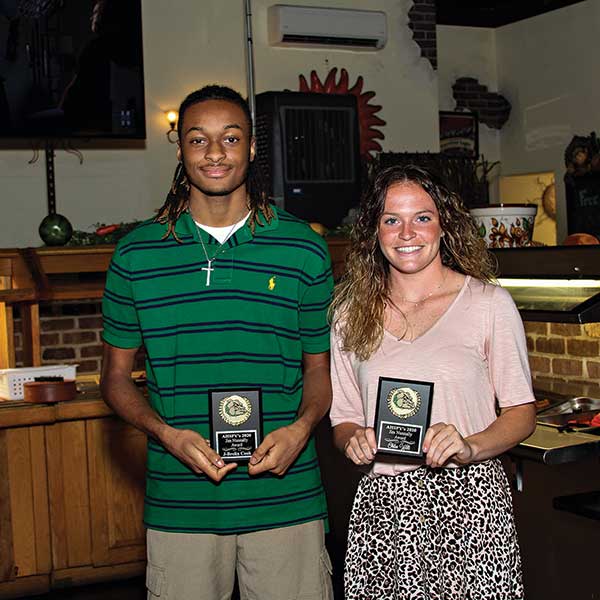
As the interview with Dr. John McClendon drew to a close, he spoke of Jim Nunnally’s influence. “Jim didn’t just belong to me or the local kids, he belonged to all of Ashville. Think about this: He was not a principal, teacher or a coach. He was not a famous or rich alumnus. He was never an elected official. He never held any official position in the town that would suggest a role with the school. But the Jim Nunnally Award is presented still today. He was ‘Jim: supporter and friend.’ A great person loved by all who knew him.
“In short, Jim loved Ashville and Ashville loved Jim – and it was an unconditional love, the best kind of love there is. So, I guess, an even better word to describe Jim is ‘love.’ He cared deeply for the town and its people.”
There could be no better affirmation of a man’s life than to be remembered as a man who loved. Such was James “Jim” Renfroe Nunnally.














